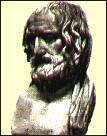 This volume contains four of Euripides plays, written in the later part of his career. He died in his eighties (I think), and wrote some 80 plays, possibly as many as 92. The four plays are Ion, Orestes, Phoenician Women and Suppliant women.
This volume contains four of Euripides plays, written in the later part of his career. He died in his eighties (I think), and wrote some 80 plays, possibly as many as 92. The four plays are Ion, Orestes, Phoenician Women and Suppliant women.Reading these pre-Christian authors, two and a half thousand years old, you marvel at how fresh and accessible they are. It’s like having a clear headed person here today trying to sort out your problems.
In a previous book I read by Harold Bloom, he said how our cognitive make-up is Greek, while our spiritual composition is Hebrew. There plays prove just that, in how we sort out and resolve our human dilemmas. Indeed, the plays almost read like soap operas, with plots and characters continuing on in various plays.
As for the many gods and their shenanigans, they pretty much represent our totally irrational and cruel sides. They get away with murder, and seem like our dark, shadowy sides. And because there are so many of them, they are like constant companions, popping up all the time to resolve and explain things. Unlike the god of the old testament, that earth shattering, fist shaking tyrant. Get on the wrong side of him and you’re done for.
Here is one of my favourite quotes with regards to war, from Suppliant Women:
‘For when the people are to vote for or against war, no one takes into consideration the possibility that he himself may die, but diverts this misfortune on to someone else. If death were visible as votes were cast, Greece would never be destroyed by the madness of war.’
No comments:
Post a Comment